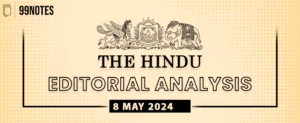Topic: GS2 – International Relations – Important International institutions Understanding India’s role in SCO, its stance on terrorism, and SAGAR’s relevance enhances knowledge for UPSC international relations. |
| Context: |
| ● The Defence Secretary reaffirmed India’s commitment to peace in the SCO region, urging zero tolerance for terrorism and promoting SAGAR in the Indo-Pacific. |
Analysis of news:
- Defence Secretary Shri Giridhar Aramane attended the SCO Defence Ministers’ meeting in Astana, Kazakhstan.
- All SCO Member States’ Defence Ministers signed a protocol and issued a Joint Communique.
- The Communique emphasised the principle of ‘One Earth, One Family, One Future’, echoing the Indian philosophy of ‘Vasudhaiva Kutumbakam’.
- India reaffirmed its commitment to peace, stability, and security in the SCO region.
- Shri Aramane stressed the need for a zero-tolerance approach towards terrorism in all its forms.
- India advocated for the Comprehensive Convention on International Terrorism at the UN.
- The concept of ‘Security and Growth for All in the Region (SAGAR)’ for the Indo-Pacific was highlighted.
- The meeting aimed at enhancing cooperation among SCO Member States for mutual prosperity and development.
| Shanghai Cooperation Organisation (SCO) |
Shanghai Cooperation Organisation (SCO): ● The Shanghai Cooperation Organisation (SCO) is a Eurasian political, economic, and security alliance. ● Founded in 2001, it comprises eight member states: China, Russia, India, Pakistan, Kazakhstan, Kyrgyzstan, Tajikistan, and Uzbekistan. ● SCO aims to promote cooperation on security, counter-terrorism, trade, and cultural exchanges. ● It holds regular summits, ministerial meetings, and joint military exercises. ● The organisation facilitates dialogue and cooperation among member states to address regional challenges and promote stability. ● India and Pakistan joined as full members in 2017, expanding SCO’s geopolitical significance. ● India views SCO as a platform to enhance regional connectivity, counter-terrorism efforts, and boost economic cooperation. ● SCO’s growing influence in Central Asia and beyond underscores its importance in shaping regional dynamics. Importance of SCO from Indian perspective: ● Regional Security: SCO provides a platform for cooperation among member states in addressing regional security challenges, including terrorism, extremism, and separatism, which are of concern to India. ● Counter-terrorism Cooperation: SCO facilitates collaboration among member states in counter-terrorism efforts, intelligence sharing, and joint military exercises, contributing to India’s counter-terrorism strategy. ● Economic Integration: SCO promotes economic cooperation, trade, and investment among member states, offering opportunities for India to enhance economic ties, connectivity, and access to markets in Central Asia. ● Energy Security: SCO member states are rich in energy resources, and cooperation within the organisation enhances India’s energy security through partnerships in oil, gas, and renewable energy projects. ● Multilateral Diplomacy: Participation in SCO summits and meetings allows India to engage in multilateral diplomacy, strengthen diplomatic relations, and build strategic partnerships with member states and observer countries. ● Regional Stability: India’s membership in SCO contributes to regional stability, peace, and cooperation in Central Asia and beyond, aligning with India’s strategic interests in the region. |
PYQ: (UPSC civil services prelims 2022) Q. Consider the following: 1. Asian Infrastructure Investment Bank 2. Missile Technology Control Regime 3. Shanghai Cooperation Organisation India is a member of which of the above? (a) 1 and 2 only Ans: Option D
Mains: Critically examine the aims and objectives of SCO. What importance does it hold for India? (250 words/15m)(UPSC CSE (M) GS-2 2021) |
| Practice Question: Discuss India’s strategic objectives and contributions within the Shanghai Cooperation Organisation (SCO), emphasising its stance on terrorism and regional cooperation. (250 Words /15 marks) |











